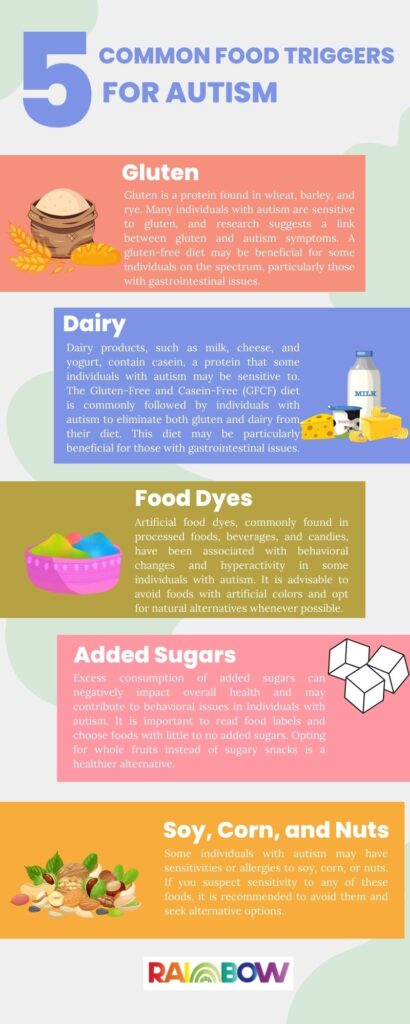Children diagnosed with ASD often face sensory challenges with food, showing heightened sensitivities to taste, smell, texture, and color. These challenges can greatly impact their eating habits and overall nutritional intake.

Sensory Challenges with Food
Children with autism tend to have specific sensory preferences when it comes to food. They may prefer foods with certain textures, such as smooth, cold, or crunchy. This preference for specific textures can limit their dietary choices and lead to nutrient deficiencies. It is important to acknowledge and address these sensory challenges to ensure that children with autism receive adequate nutrition.
Importance of Sensory Foods
To address the sensory challenges faced by individuals with autism, it is crucial to explore sensory foods. Sensory foods are those that engage multiple senses, including touch, smell, sight, and taste. These foods can help broaden the palate of children with autism and improve their acceptance of a variety of foods in their diet.
Introducing sensory foods based on textural preferences can be particularly beneficial. For example, for children who prefer cold foods, options like yogurt, ice cream, and cold fruit puree may be appealing. Colorful sensory foods like strawberries, blueberries, carrots, or bell peppers can also be more visually stimulating and attractive to children with autism. By incorporating these foods, we can enrich their diet with essential vitamins and minerals.
In addition to expanding the range of food choices, sensory foods play a vital role in improving motor skills. Foods that require more effort in chewing or those that can be eaten with fingers can help enhance chewing abilities and fine motor skills in children with autism.
By understanding the sensory challenges faced by individuals with autism and the importance of sensory foods, we can work towards improving their eating habits and overall nutrition. Incorporating a variety of sensory foods in their diet not only engages their senses but also helps to ensure that they receive the necessary nutrients for their growth and development.
Nutritional Needs for Children with Autism
When it comes to the nutritional needs of children, there are other factors to consider beyond mere dietary requirements. Things like textural preferences and visual appeal matter as well.
For children on the autism spectrum, sensory sensitivities can profoundly influence their relationship with food, making it a must to tailor meals to accommodate their unique sensory profiles.
Textural Preferences in Autism
Children with autism tend to have specific textural preferences when it comes to food. They may prefer foods that are smooth, cold, or crunchy in texture. Providing sensory foods based on their textural preferences can enhance their nutritional intake and make mealtime more enjoyable. For example, incorporating foods like yogurt, ice cream, and cold fruit puree may appeal to those who favor cold foods. By incorporating a variety of textures, children with autism can broaden their palate and accept a wider range of foods in their diet.
Visual Appeal in Food Choices
Colorful sensory foods can play a significant role in the diet of children with autism. Introducing visually stimulating foods, such as strawberries, blueberries, carrots, or bell peppers, can enhance their diet with essential vitamins and minerals. The vibrant colors of these foods not only make them more visually appealing but also provide important nutrients that support their overall health. By incorporating a variety of colorful foods, caregivers can help ensure that children with autism receive a well-rounded and nutritious diet.
Motor Skills Development
Sensory foods not only encourage mindful eating by engaging the senses of touch, smell, sight, and taste, but they also aid in improving a child’s motor skills. Certain foods require more effort in chewing or can be eaten with fingers, which helps enhance chewing abilities and fine motor skills. By incorporating foods that require different levels of chewing or those that can be picked up and eaten with fingers, children with autism can develop and strengthen their motor skills while enjoying their meals.
Understanding the textural preferences, visual appeal, and motor skills development of children with autism is crucial for providing them with a balanced and nutritious diet. By incorporating sensory foods that align with their preferences, caregivers can help promote healthy eating habits and support their overall growth and development.

Beneficial Foods for Autism
While taking care of their sensory preferences, it is still important to focus on foods that provide essential nutrients to support the overall well-being of individuals on the autism spectrum.
In this section, we will explore three key aspects related to beneficial foods for autism: nutrient deficiencies, the impact of gut health, and the importance of omega-3 fatty acids.
Nutrient Deficiencies in Autism
Children with autism often have deficiencies in certain nutrients, making it crucial to prioritize a balanced diet that addresses these gaps. Nutrients such as vitamins, minerals, and essential fatty acids play a vital role in supporting cognitive function, behavior, and overall health. While each individual’s nutritional needs may vary, ensuring an adequate intake of these nutrients can help support their development.
To address potential nutrient deficiencies, incorporating a variety of nutrient-rich foods into the diet is essential. This includes lean proteins, fruits, vegetables, whole grains, and healthy fats. Additionally, considering multivitamins, probiotics, and essential fatty acid supplements can help fill nutritional gaps and support overall health.
Impact of Gut Health
The connection between autism and the gut microbiome has gained increasing attention in recent years. Research suggests that there is a relationship between the gut microbiota and the severity of autism. Therefore, promoting a healthy gut is crucial for individuals on the autism spectrum.
Including foods that support gut health, such as those rich in dietary fiber, is important. Prebiotic foods, like fruits, vegetables, whole grains, and legumes, promote the growth of beneficial bacteria in the gut. These foods can help maintain a healthy gut microbiome and support overall well-being.

Omega-3 Fatty Acids
Omega-3 fatty acids are essential fats that play a crucial role in brain health and development. They are known for their anti-inflammatory properties and have been found to help with hyperactivity in children with autism. Including omega-3 fatty acids in the diet can be beneficial for individuals on the autism spectrum.
Food sources of omega-3 fatty acids include fatty fish (such as salmon, mackerel, and sardines), walnuts, flaxseeds, and chia seeds. If it is challenging to incorporate these foods into the diet, omega-3 supplements may be considered. However, it is recommended to consult with a healthcare professional before starting any supplements.
In summary, a balanced diet that includes a variety of nutrient-rich foods can be beneficial for individuals on the autism spectrum. Prioritizing lean proteins, fruits, vegetables, whole grains, and healthy fats can help support gut health and brain development. Considering supplements like multivitamins, probiotics, and essential fatty acids can also help fill nutritional gaps.
Foods to Avoid for Autism
It’s also important to be aware of certain foods that are commonly recommended to be avoided for individuals with autism. These foods can potentially trigger negative reactions or exacerbate symptoms in some individuals on the autism spectrum. Understanding these food triggers and making informed dietary choices can contribute to better overall well-being.
Common Food Triggers
Certain foods have been identified as common triggers for individuals with autism. While these triggers can vary from person to person, it is generally recommended to limit or avoid the following foods:

Importance of Snacks
Snacks play an important role in the diet of individuals with autism. Include snacks that are free from common food triggers, such as gluten and dairy. By providing nutritious and safe snack options, you can support the dietary needs of individuals with autism while promoting their overall health and well-being. Consider incorporating snacks such as fresh fruits, vegetables, gluten-free crackers, and dairy-free yogurt alternatives.
It is worth noting that while these food triggers are commonly associated with autism, the effects of dietary changes can vary among individuals. It is recommended to work with a healthcare professional or registered dietitian who specializes in autism to create an individualized diet plan based on specific needs and sensitivities.
Role of Supplements
Individuals with autism spectrum disorder may have a limited diet, which can lead to nutrient deficiencies. In such cases, supplements can be valuable in filling nutritional gaps and addressing specific needs. Some commonly used supplements for individuals with ASD include:
Multivitamins: A multivitamin can provide essential vitamins and minerals that may be lacking in the diet. These supplements can help support overall health and address any autism vitamin deficiencies that may arise due to dietary restrictions or selective eating habits.
Probiotics: Probiotics are beneficial bacteria that can help promote a healthy gut microbiome. The connection between autism and the gut microbiome is an area of ongoing research. While the evidence is still emerging, some studies suggest that individuals with ASD may have an imbalance in their gut bacteria. Probiotic supplements can help support a healthy gut and potentially improve gastrointestinal symptoms associated with autism.
Essential Fatty Acids: Omega-3 fatty acids, such as EPA (eicosapentaenoic acid) and DHA (docosahexaenoic acid), are known for their anti-inflammatory properties and are important for brain health. Some individuals with autism may have difficulty obtaining sufficient amounts of these fatty acids from their diet. Omega-3 fatty acid supplements, typically derived from fish oil, can help bridge this gap and support cognitive function and overall well-being.
When considering the use of supplements, it is crucial to consult with a healthcare professional or registered dietitian who specializes in autism and nutrition. They can assess individual needs and recommend the appropriate supplements based on specific requirements.
It’s important to remember that every individual with autism is unique, and what works for one person may not work for another. It’s recommended to work closely with a healthcare professional or registered dietitian along with ABA Therapy Services to determine the most suitable dietary approach and supplement regimen for individuals with autism spectrum disorder.

